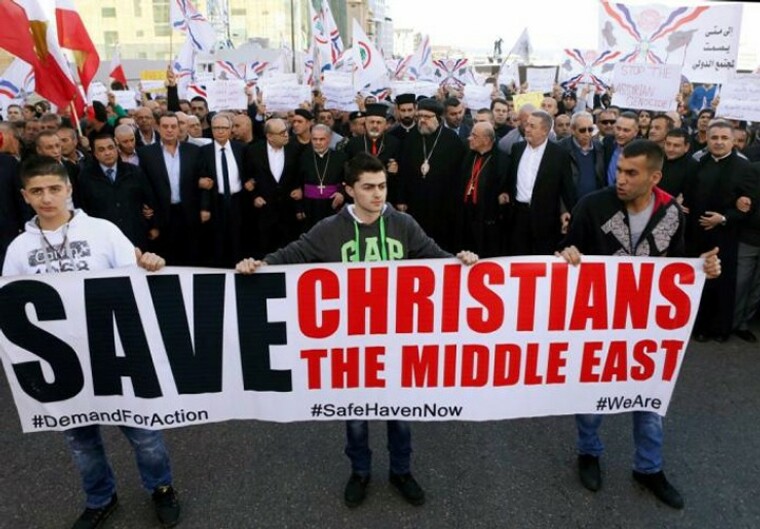Kerry: 'Non-state actors,' or terrorists, greatest threat to religious liberty

WASHINGTON (Christian Examiner) – Governments in Africa, Asia, the Middle East and Southeast Asia continue to fan the flames of religious persecution, but "non-state actors" – terror groups – are the greatest threat to religious freedom, Secretary of State John Kerry said in the U.S. State Department's annual report on religious liberty.
The report, released Oct. 14, names al-Qaeda, al-Shabaab and Boko Haram as significant threats, but it labels the Islamic State, referred to by the term "Daesh," as the greatest threat to religious liberty in the world. "Daesh" is, in some respects, a more accurate acronym for the terror group.
Its name in Arabic is al-Dawla al-Islamiya fi al-Iraq wa al-Sham, but "Daesh" is also an insult used for those who impose their religion on others – a "bigot" of sorts.
"In the Middle East, Sub-Saharan Africa, and throughout Asia, a range of non-state actors including terrorist organizations, have set their sights on destroying religious diversity. Members of religious groups were disproportionately affected, often suffering harsh and hateful treatment of non-state actors. In these regions, religious intolerance and hostility, often combined with political, economic and ethnic grievances, frequently led to violence. Governments stood by, either unwilling or unable to act in response to the resulting death, injuries and displacement," Kerry said in the report.
When governments fail to respect those laws, obligations and standards, whether by deed or inaction, they legitimize and facilitate non-state actors who persecute and discriminate against members of vulnerable religious communities, nurture an environment of intolerance, and weaken the ties that support peaceful and resilient societies.
Kerry added that governments are obligated to protect the human rights and religious liberty of all citizens and should not promote a single religion to the exclusion of others. Those rights include leaving a faith or changing one's faith, he said. In particular, the Islamic State has singled out for execution Muslims who have left Islam for Christianity. They have also killed thousands of Shiite Muslims, drawing Iran into the conflict.
"When governments fail to respect those laws, obligations and standards, whether by deed or inaction, they legitimize and facilitate non-state actors who persecute and discriminate against members of vulnerable religious communities, nurture an environment of intolerance, and weaken the ties that support peaceful and resilient societies," Kerry said.
Kerry drew attention to religious freedom violations in Nigeria, Burma, Sri Lanka, Pakistan, China, Tibet, Vietnam and Burma, as well as in Ukraine, where separatists are waging a war supported by Russia.
"In the areas they control, the separatists have kidnapped, beaten, and threatened Protestants, Catholics, and members of the Ukrainian Orthodox Church of the Kyiv Patriarchate, as well as participated in anti-Semitic acts," Kerry said.
Importantly, Kerry said some improvement had been seen in areas where radical Islamists seemingly gained a foothold as a result of the Arab Spring, which the United States described as a "pro-democracy" movement. It was, in reality, an Islamist movement.
In Egypt, for instance, Kerry said the plight of Egyptian Coptic Christians are better off than they were under successive governments which "failed to redress policies that discriminate against Christians, especially the onerous discrimination they have faced in church construction and renovation."
"Under the interim and al-Sisi governments, there have been encouraging improvements in the status of Christians in Egypt. There have been some convictions of perpetrators of violence against Copts, although impunity from prosecution for such crimes remains a serious problem. The new Egyptian constitution provides increased human rights protections as compared to the previous constitution, including a stipulation of equality before the law irrespective of religion. It also requires that parliament pass a new law facilitating the construction and renovation of Christian churches, which is without precedent, and provides for the establishment of an anti-discrimination commission to eliminate all forms of discrimination," Kerry said in the report.
Egyptian President Abdel Fattah al-Sisi – a former military officer and secretary of defense who ousted Muhammad Morsi – has called for a "religious revolution" to combat terror groups, in particular ISIS, which has conducted attacks in the Sinai Peninsula.
Last week, al-Sisi granted permission for the Coptic Christian Church to begin construction of a $1.3 million church honoring the 21 Coptics beheaded on a Libyan beach by ISIS in February 2014.
Friar Rafic Greiche, spokesman for the Egyptian Catholic Church, told Asia News the president was instituting reforms so the presence of Islamic extremism in society "has been progressively waning. Add to that the fight against fundamentalism, sectarianism and extremism in mosques" and there is "more secularism without the rejection of religion."
Egypt, Greiche said, "is trying to build a society that cares about religion, but one not based on differences between Christians and Muslims."
The report also claimed some countries, such as Denmark, were plagued by "islamophobia." An executive summary of the State Department's report can be found here.